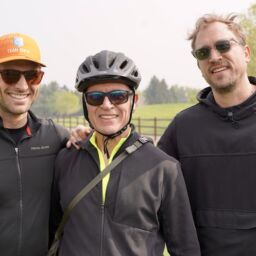Recently we had the good fortune of meeting Jennifer Larsen, a personal trainer who helps people with Parkinson’s live well… including one of our very own Ambassadors. We hear a lot from physical therapists, occupational therapists and coaches, but we’ve yet to go deep with a personal trainer to learn the ins and outs of working with someone living with Parkinson’s. Whether you already work with a personal trainer, or you’re wondering how working with one might help you to live better with Parkinson’s, we hope you find this interview with Jennifer helpful.
How did you become interested in working with people with Parkinson’s?
I had my first client living with Parkinson’s in 2005. She had been recently diagnosed and was looking for someone to help her improve her fitness level. We were both new to the Parkinson’s world, but we were both committed to learning about the disease and helping her develop a program to keep her strong. At the time, there was very little research about exercise for people with Parkinson’s. As I learned about the physical challenges that Parkinson’s presents, it pushed me to develop specific exercise programs to help keep people with Parkinson’s as strong as possible.
What Parkinson’s-specific training have you had?
I earned my Masters in exercise science and health promotion with an emphasis in rehabilitation science, and I have worked with Parkinson’s Wellness Recovery (PWR), PD Warrior and Delay the Disease.
What are some issues that people with Parkinson’s should be aware of when they are looking for personal trainers or exercise classes?
One of the most basic yet essential qualities to look for when hiring a personal trainer is a connection. You are potentially creating a long-term relationship, and the two of you will work as a team. When you’re choosing a personal trainer, consider asking them specific questions about the population they usually work with, whether they have experience working with people with Parkinson’s, whether their time availability falls within your “ON” or “OFF” periods and generally how you feel about their attention to your goals.
When looking for an exercise class, I don’t think it’s necessary to only attend Parkinson’s-specific classes. See what’s available in your area and focus on what interests you. Look for a class that fits your current fitness level and is within your comfort zone in terms of safety. No matter what, it’s important to speak with the instructor before you begin a class to let them know if you have any concerns regarding your participation in the class, or if you have any muscular issues that need to be addressed. Remember your safety is first. Do what feels right for you. Be open to trying different forms of exercise. Classes are a great way to open up your movement “toolbox”!
Do you always work one-on-one with your clients? What does a typical session involve?
I teach Parkinson’s-specific exercise classes, with about 20 participants per class, and I also work one-on-one with clients. A typical one-on-one session involves warm-up exercises, focusing on walking drills and big whole-body movements, strength exercises focused specifically on muscles that support walking, posture and upper body and finally core exercises and balance.
Do you collaborate/communicate with any of their other healthcare providers?
When my clients request it, I will speak with anyone on their medical team. I typically see my clients between one and four times a week. I have information and insight that can be useful to the other care providers who see my clients less frequently, so I also work with some of my clients’ doctors to implement their fitness prescriptions. I also receive referrals from physical therapists when it’s time for their patients to transition from physical therapy, which ensures that the client maintains the progress they have achieved and continues to work in a way that prevents future injury.
What advice do you have for people who don’t have access to personal trainers who specialize in working with people with Parkinson’s?
There are three main ways you can make sure that you are getting the most accurate and useful fitness advice, even if you don’t have access to personal trainers who specialize in working with people with Parkinson’s:
#1 Find the right person
Even if the personal trainers in your area aren’t known for working with people with Parkinson’s, you can still get training that is specific to you. The most important step is just to make sure that the trainer you’re working with is willing to learn! Every person working with the Parkinson’s community was new at one point, so you can help your trainer step into this sector of fitness.
#2 Provide resources
If your trainer doesn’t have experience with people with Parkinson’s, you can help them to give you the best specific care by giving them access to resources like websites, articles, YouTube videos and blogs on Parkinson’s exercise or by asking your neurologist or primary care physician for Parkinson’s-specific exercises.
#3 Be your own best advocate!
You are the expert on you, and you are also responsible for your fitness; so, be proactive in your exercise health. Most personal trainers will support you and want to help keep you fit, strong and flexible, but you have to be your own advocate.
If you could give one piece of advice to people living with Parkinson’s, what would it be?
Keep moving! Give 100% every day. Sometimes that might mean you march in place for two minutes (or in a chair) and stretch to the ceiling 10 times; sometimes it might mean you can practically run a marathon; sometimes, it’s somewhere in between… but no matter what, don’t give up and just keep moving.
Jen Larsen is a personal trainer living in the San Fransisco Bay Area who specializes in working with people with Parkinson’s. If you’re interested in learning more about Jen and the work she does, you can reach her at jen.larsen@me.com.
Want More Practical Articles Like This?
Much more can be found in our latest edition of Davis Phinney Foundation’s Every Victory Counts® manual. It’s packed with up-to-date information about everything Parkinson’s, plus an expanded worksheets and resources section to help you put what you’ve learned into action. Request your copy of the Every Victory Counts manual by clicking the button below.

















